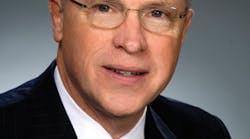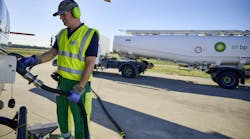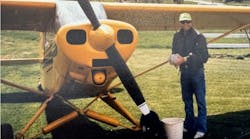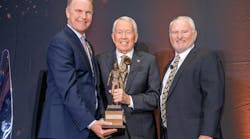It's been a year since Jordan Hansell, then NetJets president, took over as CEO after his predecessor, David Sokol, stepped down in the wake of allegations of insider stock trading.
Hansell has presided over improvements at the fractional jet-ownership company that Berkshire Hathaway CEO Warren Buffett once considered the biggest worry among Berkshire's vast holdings. The company's $711 million loss in 2009 has been replaced with a profit of $227 million in 2011.
And yet, Hansell knows that challenges lie ahead as NetJets opens its new headquarters at Port Columbus.
The U.S. economic recovery still has a long way to go, and the European market -- a big one for NetJets -- is in tatters. The company is set to enter the potentially lucrative Chinese aviation market. And NetJets is embroiled in a lawsuit with the Internal Revenue Service.
Hansell, a lawyer by training, recently sat down with The Dispatch to discuss his company's future.
Q: What was it like taking over as CEO during a difficult time and under such unusual circumstances?
A: It was mostly fun. I have a great team of folks, and an especially strong team that works on a daily basis with me. There was no need to make drastic changes. Those had already been made.
Q: So, you stuck to the 10-year strategic plan already in place?
A: Yes. The plans were in place for the refreshing of the fleet, for our small-cabin and our mid-cabin fleets, and we're on the cusp of a decision and an announcement for our mid-cabin fleet.
Q: Having a plan is great, but isn't it dependent on the economy?
A: Someone once told me the role of a manager is to make sure you cover the downside of a business, and that the upside, at least by comparison, will take care of itself. We're constantly planning for the worst and best outcomes, and make decisions that allow us the flexibility to operate within that range. But yes, we clearly are dependent on the macro economy.
Q: Explain what's going on in China. (NetJets recently announced that it is entering the market in partnership with a consortium of Chinese investors.)
A: We have to be locally owned to satisfy aviation regulations. So, in China, we had to find Chinese investors to own a majority of the entity, and we've done that. China is promising, in the sense that it's large and geographically dispersed, so air travel is appealing to folks ... And, the Chinese government has identified business aviation as an industry it would like to foster.
Q: Does this mean the government will build airports?
A: It means the airports will be built. Whether it's them or someone else is not clear.
Q: How is the economic situation in Europe affecting you?
A: It's difficult for everyone, and over there now, it's much like it was here in 2008 and 2009. Overall, in the European Union, we're static. Western Europe is down, but some newer areas of the EU, like Turkey and also Russia, are up. Overall, it's about a push.
Q: Any plans to resume Middle East operations? (NetJets recently ended a franchise-type arrangement in Saudi Arabia.)
A: We service the Middle East through our European operation ... We have been talking to some folks over there, but we've been taking it slowly since the Arab Spring. That part of the world has slowed down economically.
Q: How will this battle with the Internal Revenue Service affect you? (NetJets has sued the IRS for $642 million, saying it wrongly applied a ticket tax meant for commercial airline passengers to users of its private jets; the IRS countersued, saying that NetJets owes an additional $366 million in taxes.)
A: We can't comment on pending litigation.
Q: Can you comment on the effect of the new FAA regulations that eliminated this ticket tax for NetJets?
A: It clarifies all the rules, about how the fractional industry will be treated and the types of taxes we have to pay ... We'll no longer be paying the ticket tax, but instead will pay a higher fuel tax ... This will essentially be revenue-neutral in terms of the total taxes we'll pay.
Q: What is your strategy for aircraft acquisition? (NetJets has agreements to buy 125 Embraer Phenom 300 jets -- 50 firm orders and options on 75 more -- and 120 Bombardier Global aircraft -- 50 firm orders and options for 70 more.)
A: We're buying a firm number of aircraft that's fewer than what's in our current fleet, but we've got options to go well above that. This will permit us to hit the number that happens in the real world. And, depending on what happens in China, we could purchase even more, but China's still a ways out, probably near the end of the 10-year cycle (to renew the fleet).
Q: What's the future of NetJets look like?
A: Barring some major economic shift ... we feel pretty good about where we're at. We're going to continue to perform at the highest level we can, and we'll expand into China if we get regulatory approval, which I'm optimistic about. And we'll start refreshing the fleet over the next few years. There's a lot going on, and this is a very exciting time. And, we're keeping our fingers crossed the economy will continue to come back as it has.
New HQ brings employees together
For most companies, hearing the roar of jets taking off and landing just outside the corporate headquarters day after noisy day would be a problem.
Not at NetJets.
"We love that sound," said Jeff Stark, NetJets' vice president for facilities and security. He's the one in charge of the company's $21 million, 140,000-square-foot headquarters building, which officially opens today with a ribbon-cutting ceremony.
"We have employees who can tell you, just from the sound of the engine, what type of aircraft it is."
The new headquarters is at the northern edge of Port Columbus, next to an existing NetJets building that will remain home to about 800 flight-operations employees. The new corporate headquarters features lots of windows and views of the airport's runways and even Downtown.
The new building has allowed NetJets to move about 500 employees out of leased space in Easton Town Center.
Daimler Group built and owns the building, which NetJets leases. Stark declined to say how much NetJets pays, but he did say it will save about $900,000 a year compared with the sum it paid to lease 130,000 square feet of office space in the Easton area.
"Our main goal was to (locate the headquarters) next to our other facility," said NetJets CEO Jordan Hansell. "So that everyone could walk back and forth and exchange information and create even more of a team atmosphere."
The view of the airport, he added, "reminds people on a daily basis why we're here."
It also saves some employees time in transit. Chuck Suma said he used to have to drive between the Easton and Port Columbus offices three times a day.
"It's a totally different atmosphere here and so good to have everyone in one place," said Suma, the company's senior vice president for aircraft management.
NetJets' new headquarters
Features of the building:
* A 54-yard-long, 10-foot-wide, climate-controlled walkway between the headquarters and the company's other building
* A 200-seat cafeteria, with outdoor seating for 50 more, featuring a view of the runway
* Floor-to-ceiling windows in much of the building, designed to create a lighter, brighter working environment
* A series of huddle rooms on each of the four floors to encourage impromptu small-group meetings
* Three pieces of furniture made from airplane parts, including a fuselage bench in the lobby and an aircraft-wing conference table in a room next to the cafeteria
* A large electronic board in the lobby that shows -- on a 15-minute delay -- the location of every NetJets aircraft in the air over the United States
* A series of training rooms on the first floor that can accommodate 200 pilots
Source: NetJets
Copyright 2012 The Columbus DispatchAll Rights Reserved




